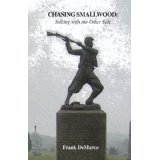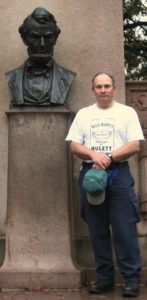
[A book with four interlocking themes:
- how to communicate with the dead;
- the life of a 19th-century American;
- the massive task facing us today, and
- the physical world’s place in the scheme of things.]

Jim at Gettysburg, 2006
.26. Fellow Soldier
[I have a friend, Jim Szpajcher, who remembers a life that ended in the old West, after the Civil War destroyed his life in the South. That Confederate soldier, named Hank, never overcame his bitterness. Curiously Jim and I, in this lifetime, perhaps serve as a bridge between Hank and Joseph who, so far as I know, never met in their lifetimes.]
[Sunday, February 5, 2006]
Anybody care to fill the final three pages of this journal book for me / with me?
This is Joseph [Smallwood]. I liked what you said to your friend [Jim] and I would like to add something for him to tell his friend Hank. I hope it was clear, what I said, that we didn’t come bustin’ south with the idea of killing everybody and burning and stealing and all the stuff that comes with war. It’s just – that’s what war is! It’s killing and doing what you need to, to try to beat the other side till they will agree to whatever you want. And if one side beats the other side absolutely flat, they’re going to do about what they want. If they beat them just a little, but not enough that they can’t see a whole lot more trouble ahead by fighting than by settling, then the losing side don’t lose quite as much; they got bargaining power. It would have been just the same if the south had won, it is just that the south wanted different kinds of things than the north did.
But I’m already off the subject. Hank, talking one fighting man to another, I want to say this to you. Probably none of us if we’d met outside of the war would ever have been enemies. Later you probably got along fair with some of the old union boys that drifted west same as you did. I hope you can find it in yourself to forgive us what we did to your world. We destroyed it, I know. What I was trying to say earlier, and got off track, we never intended to destroy your world, but one thing led to another. After a certain amount of blood was shed, it was as certain as anything on God’s earth that if we won we were going to destroy slavery. We honest to God saw it as wrong, and we believed we were doing the work the almighty wanted done, destroying it. But except for the way people get sometimes, I don’t know that we ever felt hatred for you Johnnies. We felt sorry for you when it was all over, and we sure God feared you before it was over, and first to last we figured you boys were fighting for something that didn’t care a damn about you – but nobody that I recall spent much time hating you or yours.
The war came like a tornado, and it laid flat everything it touched, and I wonder if you can see it the way I do, now, as an Act of God. The old North died, the old South died, and the war didn’t have winners as much as it had survivors.
You boys was right about some things and we was right about other things, and so no matter what happened, some right things had to go down with the wrong ones. I don’t know anybody – maybe a few, but not mostly – who didn’t have it in ‘em to feel sorry for all the suffering we saw around us. Our being there caused a lot of it, but it ain’t like we came there purposely to cause it, if you see what I mean, and it ain’t like it happened by mistake either. It was the tornado touching down.
I’m glad Frank and Jim are friends, and you and I might as well be friends too. I’m stretching out my hand to you as one survivor to another, and I do hope you can find it in you to take my hand, fellow soldier.
Frank and Jim, this is even more beautiful than when I read it for the first time in Chasing Smallwood. Helps to understand a lot of our national history as well as the human condition(s) in general.
Full of Love.
You guys do nice work!